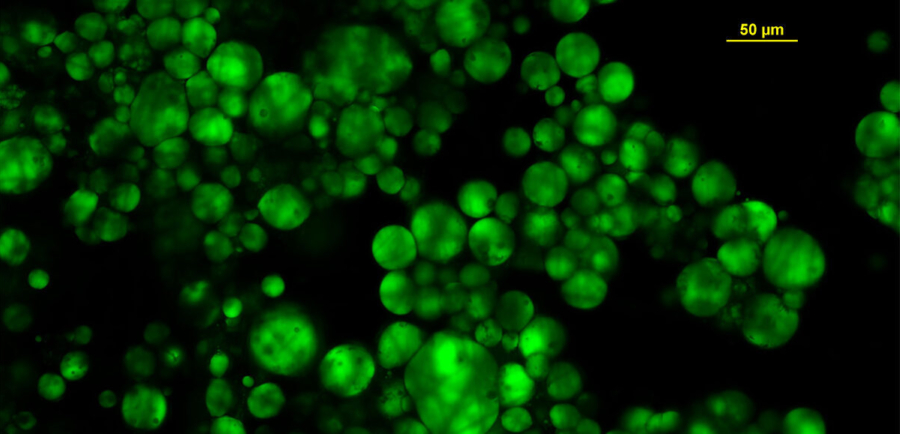Harvard licensed technology creates Obesity-on-a-Chip Service

A microscopic image of the ObaCell® Obesity-on-a-Chip with large lipid droplets (in green) that aid in mimicking adipose tissue in obese patients. Photo: Obatala Sciences
Obatala Sciences, a biotechnology company that manufactures stem cells and human-derived hydrogels, announced the accomplishment of a major milestone with the commercial launch of its ObaCell Obesity-on-a-Chip Service. The new service reflects the commercial development of a family of patents that Obatala licensed from Harvard University in 2021.
Obatala Sciences is one of several companies that have commercialized new models of human tissue and organs, called microphysiological systems (MPS), that enable better mimicking of human biology than traditional therapeutic development approaches. Obatala Sciences is the first to market a technology that enables a more holistic understanding of human adipose tissue, which is an essential organ that impacts a wide array of metabolic diseases, including obesity and diabetes. Obatala Sciences’ new service offering can reproduce the physiology of obese patients in a lab in ways never possible before, by overcoming size limitations for culturing mature adipocytes in a dish and simulating fasting and feeding in a human model system.
“With rising rates of obesity and diabetes in the United States and abroad, the need for better insights into and treatments for these diseases is paramount,” said Obatala Sciences President and CEO, Trivia Frazier. “This new microphysiological system will enable research scientists to generate better data during the preclinical research phase of drug development, resulting in both shortened timelines and better treatments.”
“We are very excited to partner with the team at Obatala for the translation of these technologies. We look forward to further collaborations as we continue to study and advance adipocyte biology and engineering,” said Kit Parker, Tarr Family professor of Bioengineering and Applied Physics at Harvard John A. Paulson School of Engineering and Applied Sciences, and director of the Disease Biophysics Group.
“The licensed technology out of Parker’s Disease Biophysics Group creates a pathway for novel therapeutics in the organ-on-a-chip industry, providing a more accurate model of human tissue compared to traditional two-dimensional culture,” stated Alan Gordon, director of Business Development at Harvard’s Office of Technology Development. “We are thrilled Obatala Sciences has hit this commercial milestone, bringing real-world solutions to patients.”
With the recent passage of the Food and Drug Administration Modernization Act 2.0, drug companies will now be able to use data from microphysiological systems, such as ObaCell Obesity-on-a-Chip, to support their Investigational New Drug filings and Obatala Sciences is well-positioned to take advantage of the changing regulatory environment by providing its customers with the technology they need to develop better therapies.





